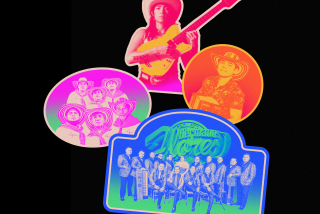WESTSIDE / VALLEY : In Harmony With Mariachis : Producer Rodri Rodriguez makes sure that the Hollywood Bowl festival is a cultural event as well as a musical extravaganza
- Share via
When the trumpets and guitars kick off the fourth annual Mariachi USA Festival at the Hollywood Bowl on Saturday, Rodri Rodriguez will be backstage, breathing a deep sigh of relief.
The 37-year-old producer, a petite, dark-haired woman with a quick smile and an engaging manner, has been successfully bringing mariachis to the Bowl since the day, four years ago, when she was told to expect no more than 3,000 or 4,000 people for the first festival.
“That’s what they told me, at the time,” said Rodriguez last week in a conversation at the sunshine-drenched Santa Monica offices of the Rodri Entertainment Group. “In the beginning, I had suggested doing the show on a partnership basis with the Bowl, but they declined. It didn’t matter. We sold every ticket--including the obstructed seats.” (The Bowl seats 17,979 when sold out.)
Mariachi USA IV will showcase mariachis from Arizona, Texas, Mexico and California. Special features include the Mariachi USA Folklorico Ballet ’93 and the Mariachi USA Symphony.
As with previous performances, this year’s festival will be as much a social and cultural event as it is a musical experience. Many families come in large groups and plan their attendance months ahead of time. Rodriguez’s office began to fill ticket orders for Saturday’s program as early as last October.
Yolanda Duarte-White, director of economic development for the Tomas Rivera Center in Claremont, began attending the event with 16 people. The group she will bring this year, counting family and friends, totals 75. “This event,” she explained, “fills me with pride, because I consider that this festival puts our Mexican culture on a well-deserved center stage in the midst of the local entertainment scene.”
“Our target audience is L.A.’s assimilated Hispanic market,” Rodriguez said. “But we draw a very mixed crowd. We have Anglos, Asians, African-Americans, Germans. It’s a wonderful cross-pollinization of people.”
Rodriguez believes that the success of Mariachi USA--which will expand to two nights next year--confirms her view of the expanding economic power of the demographic she describes as the “assimilated Hispanic market.”
“To me, every Latino who has a job, who is moving into mainstream society, is well on the way toward assimilation,” she explained. “I read The Times every morning. I watch English language news on television. I conduct my business in English.
“And, when I go home to my family, Spanish takes over. But when I go to purchase things, I’ll go to Tower Records, not a Spanish music store. And that’s where the assimilation comes in--how you do your communicating, how you do your day-to-day process.”
Rodriguez served six years as a cultural affairs commissioner for the city of Los Angeles--an experience that has left her with little appetite for political office. But she believes strongly that her position as a highly visible, economically successful Latina obliges her to speak out on issues of importance.
“I have used the Mariachi USA concerts in the past to make statements, and I’ll continue to do so,” she said. “This year, for example, I intend to address the issue of Hispanics on prime-time television--and the lack thereof. When you turn on the TV, tell me, how many Hispanics are on prime time? Go to a movie theater and tell me, how many are on the silver screen?
“The only thing that can change the situation is people. It is people who buy the products that are enriching the corporations, who in turn are buying the advertising that enables the networks to produce those programs--without very many visible Hispanics. Well, the buying power of assimilated Hispanics is now in the billions, and it’s time we began to stir up that buying power in order to start making some changes take place.”
Rodriguez’s personal history has thoroughly prepared her for the mix of entertainment business entrepreneurship and political savvy that characterizes her present activities. Born in Cuba during the last chaotic years of the Batista dictatorship, she was exposed at an early age to the urgent energies of politics.
“My father was a shipbuilding carpenter, and my mother was a seamstress,” said Rodriguez, “but there was always talk of politics. And when Castro came to power, my father knew that our lives would never be the same.”
Rodriguez was sent to the United States at the age of 7 by her parents in the early ‘60s on one of the last refugee planes allowed out of Cuba. “I was sent to Florida, where they had set up some refugee camps. I remember making friends with some of the kids, and then their parents would come, and the kids would leave. And I always thought, ‘Well, my parents are coming next.’ But they didn’t--because the freedom flights had been shut down.”
*
Thirty years after the fact, the memory is still painful. Rodriguez paused for a moment as her eyes glistened with tears and her voice cracked.
“So, they finally started placing kids in foster homes and orphanages,” she continued. “I was placed in a foster home in Albuquerque, New Mexico, where I stayed for seven years until my parents got out of Cuba.”
Rodriguez was reunited with her family when they immigrated to Los Angeles.
“It was a very strange experience,” Rodriguez said. “As hard as it was to leave my parents, it was also hard to get back together with them. In the meantime, I had learned to speak English fluently, and had become Anglicized in ways which were difficult for them to accept. When I told my father I wanted to study acting with Stella Adler, he nearly went through the roof. But I did it anyhow.”
Rodriguez did, however, follow her father’s advice to “do something more solid than acting--something behind the scenes.”
“So I said, ‘All right, I’ll be a producer,’ ” she added. “Of course I didn’t know anything at all about being a producer. The first artist I produced was (Mexican singer) Raphael. I had no idea what the heck I was doing. I knew I had to advertise, so I took a little ad in small newspapers, and did some radio things. We sold out, and it was great.
“Then I got a call from someone who said, ‘Look, Rodri, we have this artist. He’s never been here before, but he’s really great, and we think you can work well with him.’ It turned out to be Julio Iglesias. To me, it could have been Tom Smith from the corner, because I knew Julio was a recording artist who was doing OK, but I also knew it was going to be a big job to bring him into this market, where he was practically unknown.”
She has been an active producer ever since. In this country, as well as in Europe and South America, she has produced acts ranging from Vikki Carr and Dionne Warwick to Jean Luc Ponty, David Bowie and Andy Williams.
But the Mariachi USA programs clearly are the productions closest to her heart. Engaged to be married, Rodriguez is considering having the wedding at the Bowl during the Mariachi USA concert.
“I know it sounds tacky,” she said. “Even though I think that marriage is a very private thing, I’m not a private person, and the people who come to my programs are very much a part of me. I would love to share this special moment with them. But I still haven’t decided.”
*
The Mariachi USA IV Festival takes place from 6 to 10:30 p.m. Saturday at the Hollywood Bowl, 2301 Highland Ave., Hollywood. Doors open at 4 p.m. for picnickers. Tickets $10 to $60. Call (310) 451-5044.
More to Read
The biggest entertainment stories
Get our big stories about Hollywood, film, television, music, arts, culture and more right in your inbox as soon as they publish.
You may occasionally receive promotional content from the Los Angeles Times.










